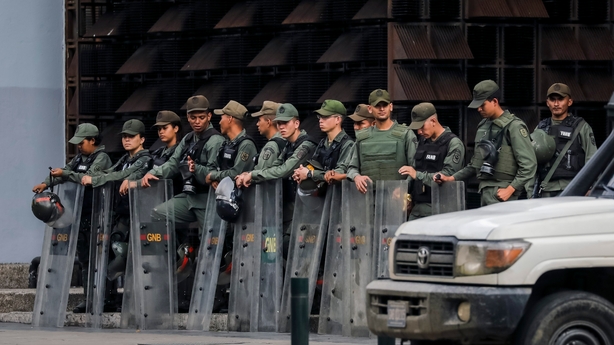Venezuela's Attorney General was fired today and ordered to stand trial, less than 24 hours after a newly elected legislative super body was installed with sweeping powers to strengthen President Nicolas Maduro's grip on power.
Since the opposition started a round of protests in April, Ms Ortega has become President Nicolas Maduro's main challenger from within the ruling socialist movement, accusing him of human rights abuses.
The new constituent assembly, which Ms Ortega said was fraudulently elected last weekend, unanimously decided to remove her in its first session today.
Mr Maduro’s loyalist Supreme Court sent a letter to the assembly informing it of an indictment against Ms Ortega, accusing her of "alleged commission of serious misconduct," without further outlining the charge.
Earlier in the day, security forces had taken up position in front of her office, blocking Ms Ortega from entering the building. She left on a motorbike amid the chaos.
We need your consent to load this rte-player contentWe use rte-player to manage extra content that can set cookies on your device and collect data about your activity. Please review their details and accept them to load the content.Manage Preferences
The constituent assembly replaced Ms Ortega with human rights ombudsman Tarek Saab, a government ally whom the opposition says has turned a blind eye to state abuses.
Ms Ortega had asked a local court to halt the inauguration of the country's new 545-member constituent assembly, citing allegations that the government fudged the results of the vote that created it.
The new legislative body has no checks on its powers, and critics say the decision to remove Ms Ortega is an ominous sign of a swerve by Mr Maduro into full-blown dictatorship.
"The constituent assembly is solving Maduro's political problems, handing out quotas, and lynching institutions," said opposition lawmaker Jose Manuel Olivares after news of Ms Ortega's removal.

Since the opposition started a round of protests in April, Ms Ortega had become the president's main challenger from within the ruling socialist movement, accusing him of human rights abuses and of running roughshod over democracy.
The constituent assembly could also re-write the constitution, re-arrange state institutions and allow Mr Maduro to rule by decree. Assembly members had said they would fire Ms Ortega the first chance they got.
The opposition, which won control of congress in 2015, boycotted last Sunday's vote, calling it a naked power grab by Mr Maduro.
The boycott meant that all candidates for the new assembly were from Mr Maduro's coalition, giving him carte blanche to pass laws aimed at locking his policies into place.
The assembly was installed despite opposition street protests. More than 120 people have died in four months of sustained marches against Mr Maduro. Critics say his policies have pushed Venezuela into an economic crisis marked by triple-digit inflation and severe shortages of food and medicine.
Mr Maduro says the US "empire" is waging economic war on Venezuela and refuses to allow humanitarian aid to enter the country. He says the new assembly is the only way to unify Venezuela into a peaceful, prosperous socialist state.
Former Foreign Minister Delcy Rodriguez, a hard-line Maduro loyalist, was named president of the new assembly.
"There is no humanitarian crisis here. What we have is love. What we have is a crisis of the right-wing fascists," said Ms Rodriguez, in a fiery inaugural address in which she paid homage to late socialist leader Hugo Chavez, Mr Maduro's mentor and predecessor.
The assembly will function in the same downtown Caracas legislative complex as the existing opposition-run congress, which could potentially be dissolved. For now, the two bodies are set to hold sessions in parallel, separated by an ornate cobblestone courtyard.

